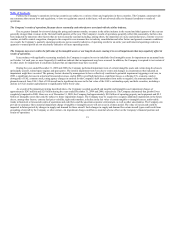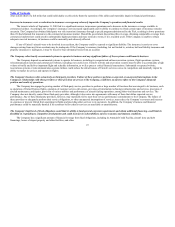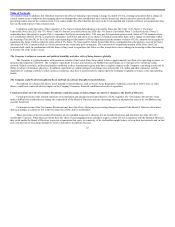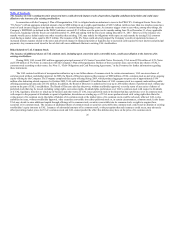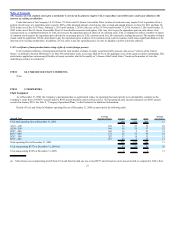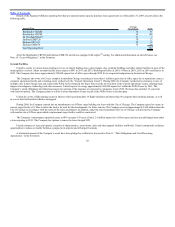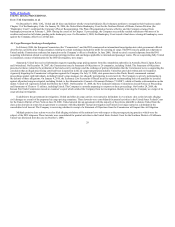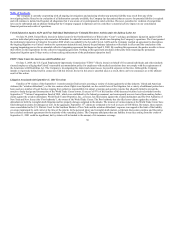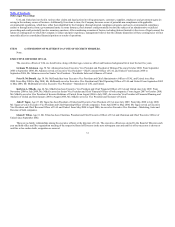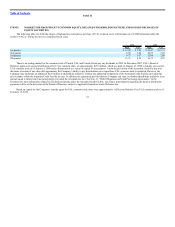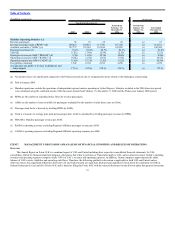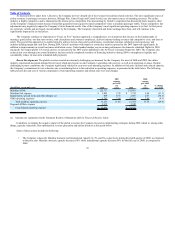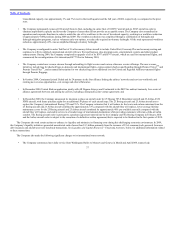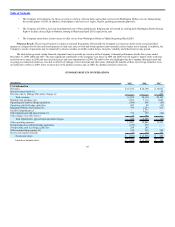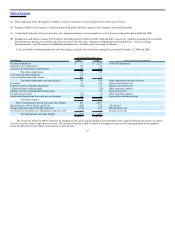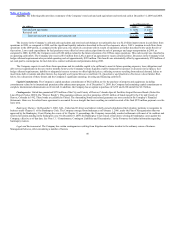United Airlines 2009 Annual Report Download - page 34
Download and view the complete annual report
Please find page 34 of the 2009 United Airlines annual report below. You can navigate through the pages in the report by either clicking on the pages listed below, or by using the keyword search tool below to find specific information within the annual report.
Table of Contents
The Company is currently cooperating with all ongoing investigations and analyzing whether any potential liability may result from any of the
investigating bodies. Based on its evaluation of all information currently available, the Company has determined that no reserve for potential liability is required
and will continue to defend itself against all allegations that it was aware of or participated in cartel activities. However, penalties for violation of competition
laws can be substantial and an ultimate finding that the Company engaged in improper activity could have a material adverse impact on our consolidated
financial position and results of operations.
United Injunction Against ALPA and Four Individual Defendants for Unlawful Slowdown Activity under the Railway Labor Act
On July 30, 2008, United filed a lawsuit in federal court for the Northern District of Illinois (the “Court”) seeking a preliminary injunction against ALPA
and four individual pilot employees also named as defendants for unlawful concerted activity which was disrupting the Company’s operations. The Court granted
the preliminary injunction to United in November 2008 which was upheld by the Seventh Circuit. ALPA and the Company reached an agreement to discontinue
the ongoing litigation over United’s motion for a permanent injunction and, instead, the preliminary injunction will remain in effect until the conclusion of the
ongoing bargaining process for an amended collective bargaining agreement that began on April 9, 2009. By reaching this agreement, the parties are able to focus
their efforts on the negotiations for the collective bargaining agreement. Nothing in this agreement precludes either party from reopening the permanent
injunction litigation upon 30 days notice or from seeking enforcement of the preliminary injunction itself.
EEOC Claim Under the Americans with Disabilities Act
On June 5, 2009, the U.S. Equal Employment Opportunity Commission (“EEOC”) filed a lawsuit on behalf of five named individuals and other similarly
situated employees alleging that United’s reasonable accommodation policy for employees with medical restrictions does not comply with the requirements of
the Americans with Disabilities Act. The Company is investigating this matter and cannot assess its possible exposure at this time. Although the Company
intends to vigorously defend itself in connection with this lawsuit, the law in this area is unsettled and, as a result, there can be no assurances as to the ultimate
result of this action.
Litigation Associated with September 11, 2001 Terrorism
Families of 94 victims of the September 11 terrorist attacks filed lawsuits asserting a variety of claims against the airline industry. United and American
Airlines (the “aviation defendants”), as the two carriers whose flights were hijacked, are the central focus of the litigation, but a variety of additional parties have
been sued on a number of legal theories ranging from collective responsibility for airport screening and security systems that allegedly failed to prevent the
attacks to faulty design and construction of the World Trade Center towers. In excess of 97% of the families of the deceased victims received awards from the
September 11th Victims Compensation Fund of 2001, which was established by the federal government, and consequently are now barred from making further
claims against the aviation defendants. World Trade Center Properties, Inc., as lessee, has filed claims against the aviation defendants and The Port Authority of
New York and New Jersey (the “Port Authority”), the owner of the World Trade Center. The Port Authority has also filed cross-claims against the aviation
defendants in both the wrongful death litigation and for property damage sustained in the attacks. The insurers of various tenants at the World Trade Center have
filed subrogation claims for damages as well. In the aggregate, September 11th claims are estimated to be well in excess of $10 billion. By statute, these matters
were consolidated in the U.S. District Court for the Southern District of New York and the aviation defendants’ exposure was capped at the limit of the liability
coverage maintained by each carrier at the time of the attacks. In the personal injury and wrongful death matters, settlement discussions continue and the parties
have reached settlement agreements for the majority of the remaining claims. The Company anticipates that any liability it may face arising from the events of
September 11, 2001 could be significant, but by statute will be limited to the amount of its insurance coverage.
30



